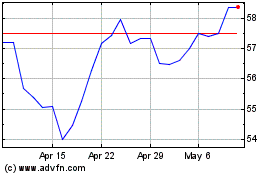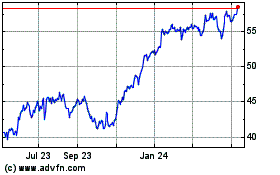A New Computer Glitch Is Rocking the Mutual Fund Industry
August 26 2015 - 2:10PM
Dow Jones News
The U.S. fund industry was in turmoil Wednesday as executives
scrambled to respond to a computer glitch that prevented dozens of
mutual and exchange-traded funds from promptly pricing their
securities.
The outage, which wasn't believed to be related to the market
turbulence Monday that included the largest-ever intraday decline
in the Dow Jones Industrial Average, prompted emergency meetings
Wednesday at banks, fund companies and financial intermediaries, as
directors and executives sifted through pricing data and addressed
likely legal ramifications of any mispricings.
The promise of accurate, readily available pricing lies at the
heart of the industry's pitch to investors and any problems could
have significant implications for the industry, analysts said.
Bank of New York Mellon Corp. said it was having problems with a
SunGard Data Systems Inc. system that "has impacted a limited
number of fund accounting clients and the processing of net asset
values of certain mutual funds and ETFs," a spokesman said in a
statement Wednesday. Bank of New York Mellon acts as a custodian
for asset management firms, providing accounting services that
include calculating the price of the funds' securities each day.
The company relies on SunGard's software system to calculate those
prices.
The problem, which began earlier in the week, has affected a
number of large mutual fund firms, including Federated Investors,
Prudential Financial Inc., Guggenheim Partners LLC and Voya
Investment Management.
Monday's trading turmoil, which saw more than a thousand shares
halted, unleashed wild trading in the ETF universe in which some
investors complained they were unable to buy or sell securities.
And the glitch was the latest example of an unexpected technology
problem reverberating across the market.
Many of the recent glitches have taken place inside stock
exchanges. NYSE halted trading on its exchange for nearly four
hours in July after a software update caused problems. Trading
continued on other exchanges, but it highlighted issues around the
fragility of the technology infrastructure on Wall Street.
The ETF pricing outage set off alarm bells in mutual fund firms,
where pricing issues are rare, say analysts and experts, and
mistakes can carry broader implications for investors. It's the
first widespread issue that asset managers have faced in at least a
decade.
"Funds have very sophisticated systems for dealing with this, so
it doesn't happen very often," said Niels Holch, the founder of the
Coalition of Mutual Fund Investors.
Executives used back-up accounting systems for calculating the
net asset values of their funds. Emergency meetings were called
with each mutual funds' board of trustees, a group of independent
directors that is involved in the pricing of fund shares. At BNY
Mellon, executives were holding multiple conference calls
throughout the week with affected fund companies, according to
people familiar with the calls.
"The SunGard system became available with limited capacity late
yesterday. Our teams have been working together to clear the
backlog and we are working with SunGard to resume normal processing
as soon as possible," the bank said.
By early afternoon Wednesday, some fund companies had received
correct net asset values from Bank of New York Mellon and were
trying to reconcile those numbers with what they had reported
earlier in the week, according to people familiar with the process.
In a statement Wednesday morning, First Trust Advisors L.P. said
that the net asset values it had reported on four of its
exchange-traded funds contained errors greater than 1%. A First
Trust spokesman didn't immediately return a call for comment.
Guggenheim Partners LLC, which offers 64 ETFs to investors, said
it had to use older data from previous days because of the problems
with Bank of New York Mellon's systems.
"Once we receive actual net asset values from our third-party
administrator, adjustments will be made and reposted to our
website, as necessary," said Ivy McLemore, a spokesman for
Guggenheim.
In a statement, Federated Investors said it has experienced a
"significant delay in the availability of net asset values" for
dozens of its mutual funds. The problems could result in a need to
reprocess trades, the company said.
A Voya spokesman said in a statement said that it was unable to
publish net asset values for its registered investment funds and
commingled funds where it serves as a trustee. The company is
"working closely with BNY Mellon" to publish net asset values for
Tuesday and Wednesday. "Voya has been providing investors and its
intermediary partners periodic updates during the situation," the
company said.
A SunGard spokesman didn't return calls for comment. A
spokeswoman for Prudential declined to comment.
Write to Kirsten Grind at kirsten.grind@wsj.com and Bradley Hope
at bradley.hope@wsj.com
Subscribe to WSJ: http://online.wsj.com?mod=djnwires
(END) Dow Jones Newswires
August 26, 2015 13:55 ET (17:55 GMT)
Copyright (c) 2015 Dow Jones & Company, Inc.
Bank of New York Mellon (NYSE:BK)
Historical Stock Chart
From Mar 2024 to Apr 2024

Bank of New York Mellon (NYSE:BK)
Historical Stock Chart
From Apr 2023 to Apr 2024
